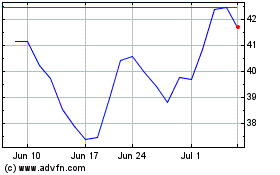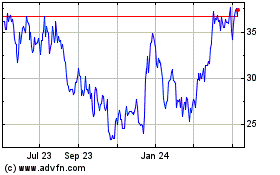Labor Unrest Strikes Mining Giants
August 09 2018 - 3:50AM
Dow Jones News
By Rhiannon Hoyle
SYDNEY--Already grappling with challenges including U.S. tariffs
and rising costs, global mining companies face another: worker
walkouts.
In Australia, roughly 1,500 employees at alumina refineries and
bauxite mines owned by Alcoa Corp., the largest U.S. aluminum
maker, are striking over pay and working conditions. That follows
labor unrest at sites including mines run by Glencore PLC in South
Africa and BHP Billiton Ltd. in Chile.
Strikes stoke volatility in global commodity markets, affecting
the prices of products from guitar strings to semiconductors.
Copper is especially prone to wild swings, given that supply is
typically in line with global demand. Loss of production from a
megapit such as Escondida in Chile or Grasberg in Indonesia, both
hit by long walkouts last year, can swing a tight market into a
shortfall.
Rising labor costs also threaten mining giants' profits, just
recovering from a deep downturn. Moody's Investors Service said if
workers strike again at Escondida--they voted in favor of a walkout
this month--it could lead to a material fall in the BHP-led
venture's production and margins.
For the aluminum industry, the strikes in Australia are
happening at an especially sensitive time.
Producers and buyers were early casualties of the Trump
administration's aggressive trade policy, as the U.S. imposed a 10%
tariff on imported aluminum earlier in the year. Alcoa, which cited
tariffs in cutting its profit outlook last month, on Monday asked
for an exemption from tariffs on aluminum imported from Canada.
The market has also been jolted this year by U.S. sanctions
against Oleg Deripaska and his Rusal aluminum empire, and by higher
electricity costs--aluminum production is energy-intensive--as oil
and coal prices rise.
Alumina, produced from bauxite, is smelted to make aluminum.
Alcoa's three refineries in Western Australia account for roughly
7% of global alumina supply, so the strike risks driving up prices,
ultimately of the products from cars to beer cans that contain
aluminum.
It is "a sufficiently large supply shock" to rattle the market,
said Macquarie. Aluminum rose 3.3% on the London Metal Exchange on
Wednesday to US$2,106 a metric ton. It surged as high as US$2,146 a
ton intraday in Asia Thursday, its highest in more than a
month.
In a statement, Alcoa said its operations in Western Australia,
which employ about 3,750 people, are continuing to run as normal,
and that it doesn't forecast reduced output.
"Our sites have contingency plans to ensure they can continue to
operate during industrial action," said Alcoa. Still, it said the
1,500 union members are expected to remain on strike until Aug. 17
and vote on a new agreement later in the month. The two sides have
been in wage talks for 18 months.
Alumina's price was already high before the strike, having risen
about 35% in 2018, said Morgan Stanley analyst Susan Bates, an
increase linked to earlier cuts at refineries in Brazil and
China.
"Since alumina accounts for 40% of aluminum smelter cash costs,
a price spike would be likely to put upward pressure on aluminum's
price," Ms. Bates said.
Write to Rhiannon Hoyle at rhiannon.hoyle@wsj.com
(END) Dow Jones Newswires
August 09, 2018 03:35 ET (07:35 GMT)
Copyright (c) 2018 Dow Jones & Company, Inc.
Alcoa (NYSE:AA)
Historical Stock Chart
From Mar 2024 to Apr 2024

Alcoa (NYSE:AA)
Historical Stock Chart
From Apr 2023 to Apr 2024
